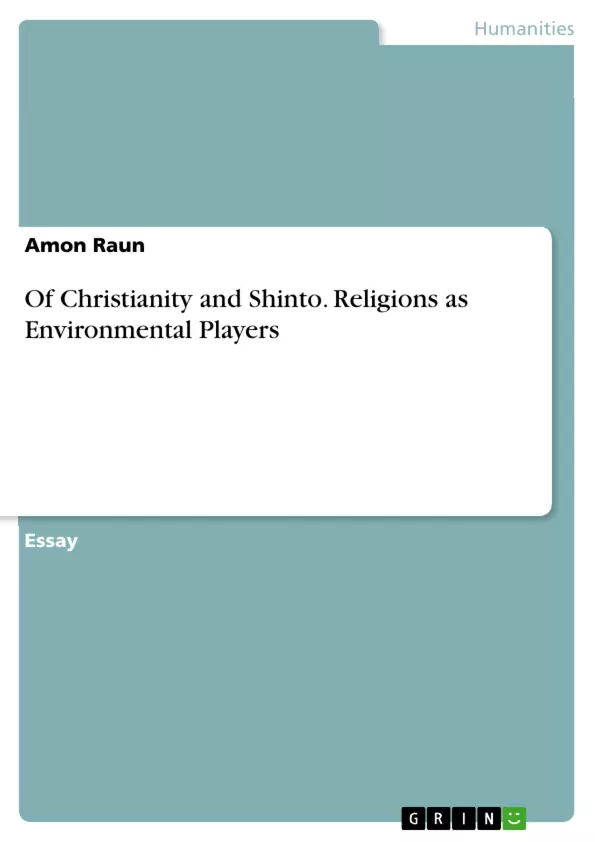I want to examine the environmental shortcomings that lay within Christianity from a philosophical standpoint based upon White’s claims and finally present a religious alternative to appreciate nature, which we find in Japanese Shintō. At the end of this essay, we will receive an understanding of the idealistic foundations of religions, their negative consequences and potentials but also the insufficiencies of making use of religion for important concerns due to their nature.
We shall not underestimate the impact ideas and believes have on how we treat the environment around us. What people think affects their behavior towards nature and vice versa affects the environment, in which one lives, how he thinks. We are in an interplay with the environment and thus shall not underestimate the impact, how different cultures view the world.
One significant shaping force is religion and – considering the industrial impact of the Western powers – we must talk about a supposed correlation between Christianity and environmental ethics. The dominant religion of the Western industrial powers internalized and spread fallible tendencies, as historian Lynn White Jr. claims in his 1967 essay “The historical roots of our ecological crisis”.
It is not merely enlightenment that deprived nature of its sacred character, but also Christian cosmology itself.
Inhaltsverzeichnis (Table of Contents)
- Of Christianity & Shintō - Religions as Environmental Players
- Introduction
- The Historical Roots of Environmental Ethics
- Christianity and its Influence on Western Environmentalism
- The Philosophical Disenchantment of Nature
- Christian Theology and the Separation of the Spiritual and Sensible
- The Destructive Impact of Pagan Animism
- The Rise of Anthropocentrism
- Shintō and its Alternative View of Nature
- The Importance of Social Harmony and More-Than-Human World-Making
- The Concept of Kami and the Elimination of the Human-Nature Divide
- Shintō Environmental Holism and Ethical Responsibility
- Conclusion
Zielsetzung und Themenschwerpunkte (Objectives and Key Themes)
This essay examines the role of religion in shaping environmental ethics, focusing on Christianity and its influence on Western environmentalism. It then presents Japanese Shintō as an alternative religious perspective that embraces nature and promotes a more holistic approach to environmental responsibility.
- The influence of Christian theology on the development of Western environmental ethics.
- The role of animism in shaping environmental values.
- The concept of anthropocentrism and its implications for environmental exploitation.
- Shintō's unique understanding of nature and its emphasis on social harmony and more-than-human world-making.
- The potential for religion to promote environmental values.
Zusammenfassung der Kapitel (Chapter Summaries)
- The essay begins by examining the historical roots of environmental ethics, focusing on the influence of Christianity on Western civilization. It argues that Christianity's emphasis on a separation between the spiritual and material world has contributed to the disenchantment of nature and its instrumentalization.
- The essay then explores the philosophical foundations of Christian theology and its impact on environmental ethics. It examines the role of ancient Greek philosophy, particularly Platonism and its dualistic worldview, in shaping Christian views on nature and human dominion over it.
- The essay also discusses the destruction of pagan animism and its significance for Christian environmentalism. It argues that the rejection of animistic beliefs has contributed to the anthropocentric worldview prevalent in Western culture.
- The essay then turns to Japanese Shintō, highlighting its unique understanding of nature and its emphasis on social harmony and more-than-human world-making. It examines the concept of kami and its implications for a holistic approach to environmental ethics.
Schlüsselwörter (Keywords)
This essay focuses on key themes such as Christian theology, animism, anthropocentrism, environmental ethics, Shintō, Japanese culture, more-than-human world-making, and social harmony.
Frequently Asked Questions
How has Christianity influenced Western environmental ethics?
According to historian Lynn White Jr., Christianity's emphasis on a separation between the spiritual and material worlds has contributed to the 'disenchantment' of nature and its exploitation.
What is the concept of "anthropocentrism" in environmental philosophy?
Anthropocentrism is a human-centered worldview that views nature as a resource for human use, a perspective often associated with Western industrial powers and Christian cosmology.
How does Shinto offer an alternative view of nature?
Shinto promotes environmental holism and eliminates the human-nature divide through the concept of 'Kami', viewing nature as sacred and emphasizing social harmony with the more-than-human world.
What was Lynn White Jr.'s main argument in his 1967 essay?
He argued that the historical roots of the ecological crisis lie in Christian theology, which established a dualism between humans and nature, encouraging environmental mastery.
What role did pagan animism play before the rise of Christianity?
Pagan animism attributed spiritual character to natural objects; its destruction by Christian expansion is seen as a factor that allowed for the instrumentalization of the environment.
- Quote paper
- Amon Raun (Author), 2023, Of Christianity and Shinto. Religions as Environmental Players, Munich, GRIN Verlag, https://www.hausarbeiten.de/document/1370019


